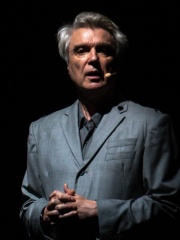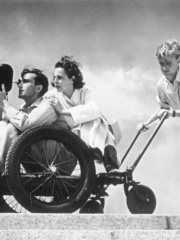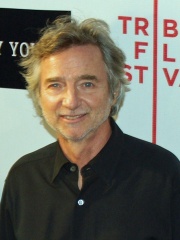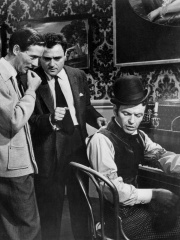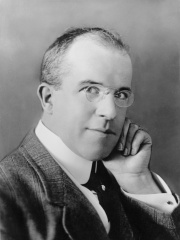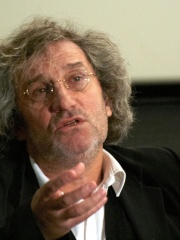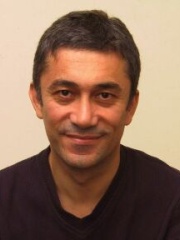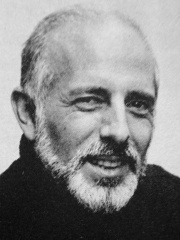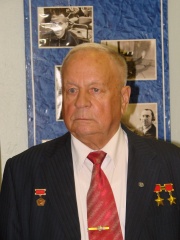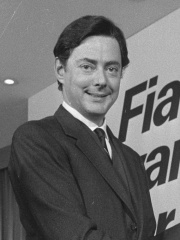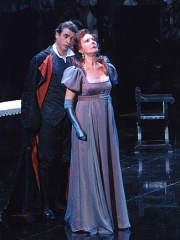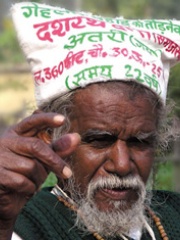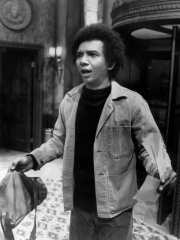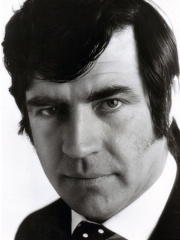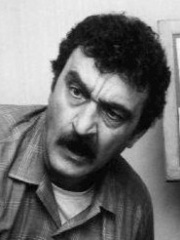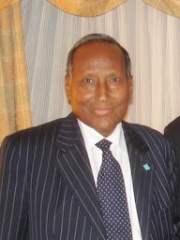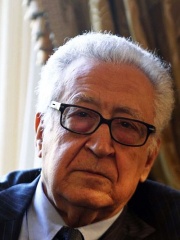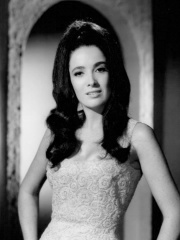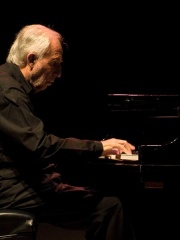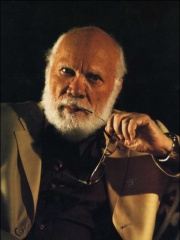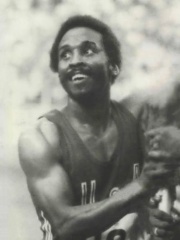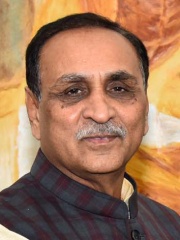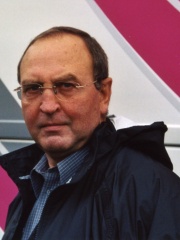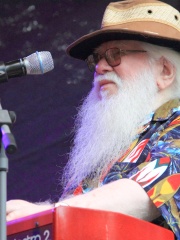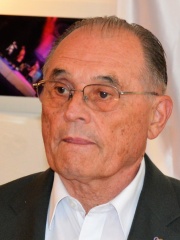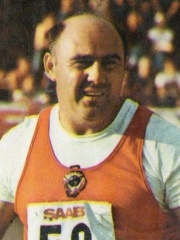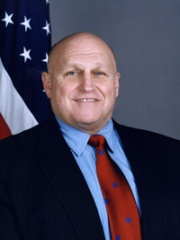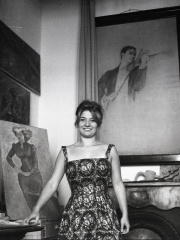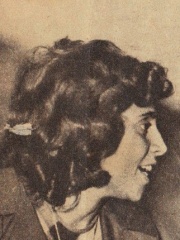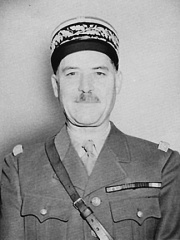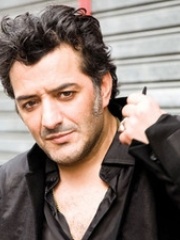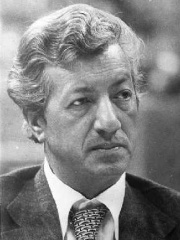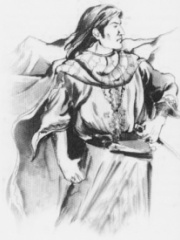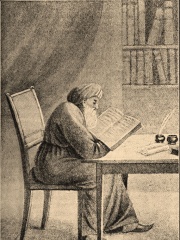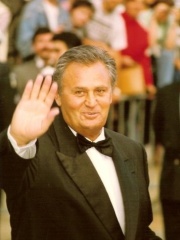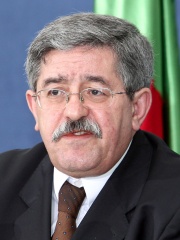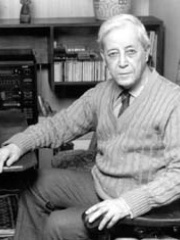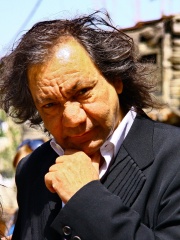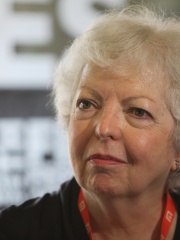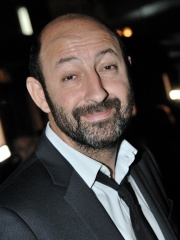FILM DIRECTOR
Mohammed Lakhdar-Hamina
1934 - 2025
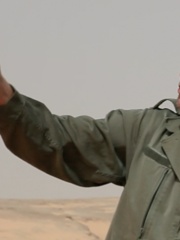
 Mohammed Lakhdar-Hamina
Mohammed Lakhdar-Hamina
Mohammed Lakhdar-Hamina (Arabic: محمد الأخضر حمينة; 26 February 1934 – 23 May 2025) was an Algerian film director and screenwriter. He is best known for his 1975 film Chronicle of the Years of Fire, which won the Palme d'Or at the 1975 Cannes Film Festival and became the first Arab and African film to win the award. He is one of the most prominent figures in contemporary Arabic cinema. Read more on Wikipedia
His biography is available in 18 different languages on Wikipedia (up from 15 in 2024). Mohammed Lakhdar-Hamina is the 472nd most popular film director (up from 885th in 2024), the 69th most popular biography from Algeria (up from 110th in 2019) and the 2nd most popular Algerian Film Director.
Memorability Metrics
Page views of Mohammed Lakhdar-Hamina by language
Among FILM DIRECTORS
Among film directors, Mohammed Lakhdar-Hamina ranks 472 out of 2,041. Before him are David Yates, Anton Corbijn, David Byrne, D. J. Caruso, Walter Frentz, and Curtis Hanson. After him are Michael Anderson, J. Stuart Blackton, Thomas Vinterberg, Philippe Garrel, Nuri Bilge Ceylan, and Jerome Robbins.
Most Popular Film Directors in Wikipedia
Go to all RankingsDavid Yates
1963 - Present
HPI: 62.25
Rank: 466
Anton Corbijn
1955 - Present
HPI: 62.22
Rank: 467
David Byrne
1952 - Present
HPI: 62.21
Rank: 468
D. J. Caruso
1965 - Present
HPI: 62.21
Rank: 469
Walter Frentz
1907 - 2004
HPI: 62.15
Rank: 470
Curtis Hanson
1945 - 2016
HPI: 62.15
Rank: 471
Mohammed Lakhdar-Hamina
1934 - 2025
HPI: 62.15
Rank: 472
Michael Anderson
1920 - 2018
HPI: 62.14
Rank: 473
J. Stuart Blackton
1875 - 1941
HPI: 62.10
Rank: 474
Thomas Vinterberg
1969 - Present
HPI: 62.07
Rank: 475
Philippe Garrel
1948 - Present
HPI: 62.07
Rank: 476
Nuri Bilge Ceylan
1959 - Present
HPI: 62.06
Rank: 477
Jerome Robbins
1918 - 1998
HPI: 62.05
Rank: 478
Contemporaries
Among people born in 1934, Mohammed Lakhdar-Hamina ranks 162. Before him are Viktor Gorbatko, Umberto Agnelli, Raina Kabaivanska, Dashrath Manjhi, Al Freeman Jr., and Alan Bates. After him are Victor French, Abdullahi Yusuf Ahmed, Lakhdar Brahimi, Linda Cristal, Jacques Loussier, and Claude Zidi. Among people deceased in 2025, Mohammed Lakhdar-Hamina ranks 187. Before him are Frankétienne, Fred Newhouse, Vijay Rupani, José Carlos, Walter Godefroot, and Hermeto Pascoal. After him are John Sykes, Ferenc Mohácsi, Anatoliy Bondarchuk, Richard Armitage, Ace Frehley, and Ayla Erduran.
Others Born in 1934
Go to all RankingsViktor Gorbatko
ASTRONAUT
1934 - 2017
HPI: 62.36
Rank: 156
Umberto Agnelli
BUSINESSPERSON
1934 - 2004
HPI: 62.33
Rank: 157
Raina Kabaivanska
SINGER
1934 - Present
HPI: 62.21
Rank: 158
Dashrath Manjhi
RELIGIOUS FIGURE
1934 - 2007
HPI: 62.18
Rank: 159
Al Freeman Jr.
ACTOR
1934 - 2012
HPI: 62.17
Rank: 160
Alan Bates
ACTOR
1934 - 2003
HPI: 62.16
Rank: 161
Mohammed Lakhdar-Hamina
FILM DIRECTOR
1934 - 2025
HPI: 62.15
Rank: 162
Victor French
ACTOR
1934 - 1989
HPI: 62.08
Rank: 163
Abdullahi Yusuf Ahmed
POLITICIAN
1934 - 2012
HPI: 62.08
Rank: 164
Lakhdar Brahimi
POLITICIAN
1934 - Present
HPI: 61.99
Rank: 165
Linda Cristal
ACTOR
1934 - 2020
HPI: 61.99
Rank: 166
Jacques Loussier
MUSICIAN
1934 - 2019
HPI: 61.92
Rank: 167
Claude Zidi
FILM DIRECTOR
1934 - Present
HPI: 61.91
Rank: 168
Others Deceased in 2025
Go to all RankingsFrankétienne
WRITER
1936 - 2025
HPI: 62.36
Rank: 181
Fred Newhouse
ATHLETE
1948 - 2025
HPI: 62.34
Rank: 182
Vijay Rupani
POLITICIAN
1956 - 2025
HPI: 62.26
Rank: 183
José Carlos
SOCCER PLAYER
1941 - 2025
HPI: 62.26
Rank: 184
Walter Godefroot
CYCLIST
1943 - 2025
HPI: 62.16
Rank: 185
Hermeto Pascoal
MUSICIAN
1936 - 2025
HPI: 62.16
Rank: 186
Mohammed Lakhdar-Hamina
FILM DIRECTOR
1934 - 2025
HPI: 62.15
Rank: 187
John Sykes
MUSICIAN
1959 - 2025
HPI: 62.05
Rank: 188
Ferenc Mohácsi
ATHLETE
1929 - 2025
HPI: 62.02
Rank: 189
Anatoliy Bondarchuk
ATHLETE
1940 - 2025
HPI: 61.94
Rank: 190
Richard Armitage
DIPLOMAT
1945 - 2025
HPI: 61.92
Rank: 191
Ace Frehley
MUSICIAN
1951 - 2025
HPI: 61.92
Rank: 192
Ayla Erduran
MUSICIAN
1934 - 2025
HPI: 61.75
Rank: 193
In Algeria
Among people born in Algeria, Mohammed Lakhdar-Hamina ranks 69 out of 213. Before him are Djamila Bouhired (1935), Alphonse Juin (1888), Rachid Taha (1958), Al-Busiri (1213), Rabah Bitat (1925), and Kusaila (640). After him are Lakhdar Brahimi (1934), Isaac Alfasi (1013), Roger Hanin (1925), Ahmed Ouyahia (1952), Évariste Lévi-Provençal (1894), and Mohammed Dib (1920).
Others born in Algeria
Go to all RankingsDjamila Bouhired
SOCIAL ACTIVIST
1935 - Present
HPI: 62.88
Rank: 63
Alphonse Juin
MILITARY PERSONNEL
1888 - 1967
HPI: 62.75
Rank: 64
Rachid Taha
MUSICIAN
1958 - 2018
HPI: 62.39
Rank: 65
Al-Busiri
WRITER
1213 - 1294
HPI: 62.37
Rank: 66
Rabah Bitat
POLITICIAN
1925 - 2000
HPI: 62.36
Rank: 67
Kusaila
POLITICIAN
640 - 688
HPI: 62.35
Rank: 68
Mohammed Lakhdar-Hamina
FILM DIRECTOR
1934 - 2025
HPI: 62.15
Rank: 69
Lakhdar Brahimi
POLITICIAN
1934 - Present
HPI: 61.99
Rank: 70
Isaac Alfasi
WRITER
1013 - 1103
HPI: 61.99
Rank: 71
Roger Hanin
ACTOR
1925 - 2015
HPI: 61.96
Rank: 72
Ahmed Ouyahia
POLITICIAN
1952 - Present
HPI: 61.86
Rank: 73
Évariste Lévi-Provençal
HISTORIAN
1894 - 1956
HPI: 61.86
Rank: 74
Mohammed Dib
WRITER
1920 - 2003
HPI: 61.69
Rank: 75
Among FILM DIRECTORS In Algeria
Among film directors born in Algeria, Mohammed Lakhdar-Hamina ranks 2. Before him are Tony Gatlif (1948). After him are Thelma Schoonmaker (1940), and Kad Merad (1964).
Tony Gatlif
1948 - Present
HPI: 64.83
Rank: 1
Mohammed Lakhdar-Hamina
1934 - 2025
HPI: 62.15
Rank: 2
Thelma Schoonmaker
1940 - Present
HPI: 59.99
Rank: 3
Kad Merad
1964 - Present
HPI: 56.59
Rank: 4


